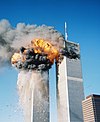
Counterterrorism, also known as anti-terrorism, relates to the practices, military tactics, techniques, and strategies that governments, law enforcement, businesses, and intelligence agencies use to combat or eliminate terrorism.

The Terrorism Act 2000 is the first of a number of general Terrorism Acts passed by the Parliament of the United Kingdom. It superseded and repealed the Prevention of Terrorism Act 1989 and the Northern Ireland Act 1996. It also replaced parts of the Criminal Justice Act 1998. The powers it provides the police have been controversial, leading to noted cases of alleged abuse, and to legal challenges in British and European courts. The stop-and-search powers under section 44 of the Act have been ruled illegal by the European Court of Human Rights.
There is no universal agreement on the legal definition of terrorism, although there exists a consensus academic definition created by scholars.

The Anti-terrorism, Crime and Security Act 2001 is an Act of Parliament of the United Kingdom, formally introduced into Parliament on 19 November 2001, two months after the terrorist attacks in the United States on 11 September. It received royal assent and came into force on 14 December 2001. Many of its measures are not specifically related to terrorism, and a Parliamentary committee was critical of the swift timetable for such a long bill including non-emergency measures.

The Prevention of Terrorism Act 2005 was an Act of the Parliament of the United Kingdom, intended to deal with the Law Lords' ruling of 16 December 2004 that the detention without trial of eight foreigners at HM Prison Belmarsh under Part 4 of the Anti-terrorism, Crime and Security Act 2001 was unlawful, being incompatible with European human rights laws.

The Anti-Terrorism Act 2005 (Cth) is an Act of the Parliament of Australia, which is intended to hamper the activities of any potential terrorists in the country. The counter-terrorism law was passed on 6 December 2005.

The Terrorism Act 2006 is an Act of the Parliament of the United Kingdom that received royal assent on 30 March 2006, after being introduced on 12 October 2005. The Act creates new offences related to terrorism, and amends existing ones. The Act was drafted in the aftermath of the 7 July 2005 London bombings, and some of its terms have proven to be highly controversial. The government considered the act a necessary response to an unparalleled terrorist threat; it has encountered opposition from those who feel that it is an undue imposition on civil liberties, and could increase the terrorism risk.

Terrorist and Disruptive Activities (Prevention) Act, commonly known as TADA, was an Indian anti-terrorism law which was in force between 1985 and 1995 under the background of the Punjab insurgency and was applied to whole of India. It was originally assented to by the President on 23 May 1985 and came into effect on 24 May 1985. This act was intended to halt the Khalistani Movement, an armed Sikh separatist movement present in Punjab. It later expanded to encompass other states as well. The Act had a sunset provision for lapsing after two years post-commencement, which it did on 24 May 1987. The Parliament not being in session, the life of the Act could not be extended. But the provisions were kept alive by an ordinance effective from the expiry date of the Act. This ordinance was later replaced with the Terrorist and Disruptive Activities (Prevention) Act, 1987. It was assented to on 3 September 1987, and made effective in two parts from 24 May 1987 and 3 September 1987. This also had a sunset provision of two years from 24 May 1987. It was renewed in 1989, 1991 and 1993 before being allowed to lapse in 1995 due to increasing unpopularity after widespread allegations of abuse. It was the first anti-terrorism law legislated by the government to define and counter terrorist activities.
From 2000 to 2015, the British Parliament passed a series of Terrorism Acts that were aimed at terrorism in general, rather than specifically focused on terrorism related to Northern Ireland. The timings were influenced by the September 11, 2001 attacks and 7 July London bombings, as well as the politics of the global War on Terrorism, according to the politicians who announce them as their response to a terrorism act.
Administrative detention is arrest and detention of individuals by the state without trial. A number of jurisdictions claim that it is done for security reasons. Many countries claim to use administrative detention as a means to combat terrorism or rebellion, to control illegal immigration, or to otherwise protect the ruling regime.

The Human Security Act of 2007, officially designated as Republic Act No. 9372, was a Philippine law that took effect on July 20, 2007. The law, which was watered-down after opposition from some politicians and rights groups feared the legislation would endanger human rights, was aimed at tackling militants, particularly the Abu Sayyaf, in the southern Philippines.

Unlawful Activities (Prevention) Act is an Indian law aimed at prevention of unlawful activities associations in India. Its main objective was to make powers available for dealing with activities directed against the integrity and sovereignty of India. The most recent amendment of the law, the Unlawful Activities (Prevention) Amendment Act, 2019 has made it possible for the Union Government to designate individuals as terrorists without following any formal judicial process. UAPA is also known as the "Anti-terror law".

The Terrorism Suppression Act 2002 is New Zealand counter-terrorism legislation passed under the Clark-led Labour government. Enacted following the September 11 attacks in the United States, the Act was designed to better address contemporary terrorism issues, both domestically and abroad. Until May 2019, the Act had not been formally used in a prosecution; however there were several failed attempts by the Crown to do so. Many individuals and organisations have however been designated as "Terrorist entities" under the Act's provisions, in line with UN Security Council designations. The Act was amended in 2007. In May 2019, a charge of engaging in a terrorist act was laid against Brenton Tarrant, the perpetrator of the Christchurch mosque attacks, under section 6A of the Act.
Civil liberties in the United Kingdom are part of UK constitutional law and have a long and formative history. This is usually considered to have begun with Magna Carta of 1215, a landmark document in British constitutional history. Development of civil liberties advanced in common law and statute law in the 17th and 18th centuries, notably with the Bill of Rights 1689. During the 19th century, working-class people struggled to win the right to vote and join trade unions. Parliament responded with new legislation beginning with the Reform Act 1832. Attitudes towards suffrage and liberties progressed further in the aftermath of the first and second world wars. Since then, the United Kingdom's relationship to civil liberties has been mediated through its membership of the European Convention on Human Rights. The United Kingdom, through Sir David Maxwell-Fyfe, led the drafting of the Convention, which expresses a traditional civil libertarian theory. It became directly applicable in UK law with the enactment of the Human Rights Act 1998.
Indefinite detention is the incarceration of an arrested person by a national government or law enforcement agency for an indefinite amount of time without a trial. The Human Rights Watch considers this practice as violating national and international laws, particularly human rights laws, although it remains in legislation in various liberal democracies.
The Terrorist Financing Convention is a 1999 United Nations treaty designed to criminalize acts of financing acts of terrorism. The convention also seeks to promote police and judicial co-operation to prevent, investigate and punish the financing of such acts. As of October 2018, the treaty has been ratified by 188 states; in terms of universality, it is therefore one of the most successful anti-terrorism treaties in history.

United Nations Security Council resolution 1624, adopted unanimously at the 2005 World Summit on 14 September 2005, after reaffirming previous resolutions on terrorism, including resolutions 1267 (1999), 1373 (2001), 1535 (2004), 1540 (2004), 1566 (2004) and 1617 (2005), the Council called on all states to co-operate in order to strengthen the security of their international borders by enhancing terrorist screening and passenger security procedures.

The National Counter Terrorism Agency is an Indonesian non-ministerial government department that works to prevent terrorism. BNPT is headed by a chief, who is responsible to the President. When it was first launched, the leader of BNPT held the ranking of a civil servant but the Presidential Regulation in 2012 elevated the post of BNPT Chief to the ministerial level.

Incitement to terrorism is a category in some national legal systems which may criminalize direct encouragement of acts of violence or praise for proscribed terrorist organizations. It was also prohibited by United Nations Security Council Resolution 1624 in 2005.
The law of extradition in the Republic of Ireland includes legislation and case law, and gives effect to treaties.









